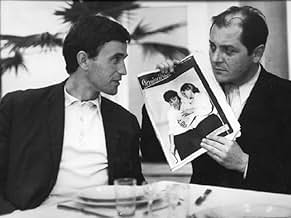A rebellious student wants to get total independence and overcome all the barriers in his life: of money, age, status, cults and conventions. However, he meets a girl with completely differe... Read allA rebellious student wants to get total independence and overcome all the barriers in his life: of money, age, status, cults and conventions. However, he meets a girl with completely different ideals.A rebellious student wants to get total independence and overcome all the barriers in his life: of money, age, status, cults and conventions. However, he meets a girl with completely different ideals.
- Awards
- 1 win & 2 nominations total
- Director
- Writer
- All cast & crew
- Production, box office & more at IMDbPro
Featured reviews
Very interesting and always surprising film by Skolimovski.
With beautiful images, a marked dreamlike and allegorical character, and an absurd sense of humor much more interesting and original than that of Polanski's Cul-de-sac of that same year, it is a pity that this small jewel of the Polish New Wave (as many others) is less well known than less interesting samples of the French or British new waves.
There is, of course, an excess of symbolism (nothing obvious otherwise), and of the allegorical (even in the soundtrack), but its playful tone (from that wonderfully surprising first scene), its careful structure, free and recurrent at the same time, and its markedly dreamlike character, save it from the simple programmatic reading.
Filled with mysterious images and moments of true poetry, it plays to the bewilderment of the viewer who is frequently disoriented but never lost.
The protagonist has entity as a character, although he functions basically as a representative of a disoriented and disappointed youth, oppressed by demands that does not know very well how to deal with. The generation that did not fight in the war, the generation that wants to buy a car, a flat, the generation that does not enter into the distribution of the insufficient cake.
Similar concerns to those of the angry young men of free cinema (just from the other side of the wall), but here with a more intellectualized tone (perhaps too much), much more inventive, experimental and lyrical approach and with less fuss, less aggressiveness and bad humor.
In short, a magnificent film, another example of a golden age of Polish cinema that is unfortunately not as well known as it deserves.
With beautiful images, a marked dreamlike and allegorical character, and an absurd sense of humor much more interesting and original than that of Polanski's Cul-de-sac of that same year, it is a pity that this small jewel of the Polish New Wave (as many others) is less well known than less interesting samples of the French or British new waves.
There is, of course, an excess of symbolism (nothing obvious otherwise), and of the allegorical (even in the soundtrack), but its playful tone (from that wonderfully surprising first scene), its careful structure, free and recurrent at the same time, and its markedly dreamlike character, save it from the simple programmatic reading.
Filled with mysterious images and moments of true poetry, it plays to the bewilderment of the viewer who is frequently disoriented but never lost.
The protagonist has entity as a character, although he functions basically as a representative of a disoriented and disappointed youth, oppressed by demands that does not know very well how to deal with. The generation that did not fight in the war, the generation that wants to buy a car, a flat, the generation that does not enter into the distribution of the insufficient cake.
Similar concerns to those of the angry young men of free cinema (just from the other side of the wall), but here with a more intellectualized tone (perhaps too much), much more inventive, experimental and lyrical approach and with less fuss, less aggressiveness and bad humor.
In short, a magnificent film, another example of a golden age of Polish cinema that is unfortunately not as well known as it deserves.
This is not only my favorite new wave piece of film-making, but probably even my fave all time movie ever. It's surreal, a bit stagy and it's cranky and twee at the same time. Mesmerising soundtrack by Krzysztof Komeda oscillating between avant-garde jazz and psychedelic choral motives fits the snapshots perfectly and the use of camera and backgrounds in most scenes is just as riveting (and pretty revolutionary for 1966 I suppose). Characteristic for Skolimowski's works abstract and sardonic humour makes it as playful and refreshing as any of the Truffaut's late 60s gems although the central theme (barriers between generations in a post-war Poland) is treated entirely seriously here. "Barrier" seems to be quite a complex cinema, bristling with ideas and references but at the same time the whole story is quite simple and beautiful and its pure joy to watch Jan Nowicki and Joanna Szczerbic as a main characters. In general I am quite surprised that "Barrier" won only main prize at Bergamo festival and it makes me pretty wistful that Skolimowski's way-out ideas for cinema from late 60s (along with "Barrier" - "Hands up" and "Le depart" come to my mind) are rather forgotten in Europe nowadays. As one of the critics wrote just before Skolimowski's retrospective at Moscow festival: "Jerzy Skolimowski, is one of those scarcely known classics whose fame comes sort of post factum" in retrospective shows when the artist said everything what he had to say". Enough said, don't miss this masterpiece if you ever have a chance to watch it.
Did you know
- TriviaFinal film of actress Maria Malicka.
Details
- Runtime1 hour 17 minutes
- Color
- Sound mix
- Aspect ratio
- 1.66 : 1
Contribute to this page
Suggest an edit or add missing content




































